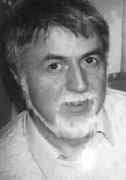Person: Murphy (2), Gerard

Gerard Murphy was an Irish mathematician who worked in functional analysis.
Mathematical Profile (Excerpt):
- Larry Murphy, who died on 22 October 1987 at the age of 82, was a window cleaner.
- Gerard attended the school Our Lady of Good Counsel in Mourne Road, Dublin.
- The fourteen year old Murphy's first job was as a telegram boy making deliveries from the Post Office in O'Connell Street, Dublin.
- After five years working as a window cleaner and studying in his free time, Murphy made the decision to give up work and concentrate full time on studying at home.
- Murphy was not studying completely on his own, however, for he had occasional help from David Simms.
- When he felt confident in his abilities, Murphy had to make a journey to England so that he could sit the examinations in London.
- Murphy was still aiming to study engineering at university but this was a course which was oversubscribed at Trinity College and the university made decisions on which students to accept based mainly on secondary school reports.
- Since Murphy had never attended a secondary school he had no school report and his application for engineering was rejected.
- This was not a total disappointment to Murphy who, by this time, had developed a love for mathematics.
- However, he did not have passes in English or a foreign language so, despite a very strong recommendation from David Simms, the admissions officer decided that all Trinity could offer to Murphy was entry to a general degree.
- Murphy accepted, despite having to take courses in pure and applied mathematics well below the level that he was at, and entered Trinity College Dublin in October 1970.
- Although Murphy was signed up for a general degree, the Professor of Mathematics, Brian Hughes Murdoch, allowed him, in addition to the courses for the general degree, to attend the course for honours students.
- Murdoch, who had studied for his Ph.D. at Princeton with William Feller, also allowed Murphy to take the examination at the end of the first term.
- Murphy performed so well in the examination that he was allowed to transfer from a general degree to an honours degree in January 1971.
- Before Murphy began his research a number of attempts to do this had been made but they had not been too successful.
- George Reid suggested to Murphy when he began his research that he try to develop a more successful theory of non-Archimedean C*-algebras.
- Murphy was soon making excellent progress and, in his second year of study at Churchill College, he was awarded the Knight Research Prize for an essay he had written.
- Murphy was awarded a Ph.D. in 1977 for his thesis Non-Archimedean Banach Algebras.
- After completing his research at Churchill College, Cambridge, Murphy returned to Dublin when he was awarded a Government Postdoctoral Research Fellowship.
- While still at Cambridge, Murphy had discussed various ideas with Trevor West (Timothy Trevor West, 1938-2012) and Roger Smyth, who were on the staff of Trinity College, and Bruce Barnes, who was on the faculty at the University of Oregon.
- Barnes spent a sabbatical year at Trinity College Dublin and, when Murphy returned to Dublin he became a member of this team.
- Before this book was published, however, Murphy had published four joint papers with Trevor West, namely Spectral radius formulae (1979), Decomposition algebras of Riesz operators (1980), Removing the interior of the spectrum (1980), and Decomposition of index-zero Fredholm operators (1981).
- In 1980 Murphy, supported by Peter Fillmore from Dalhousie University, Halifax, Canada, was awarded a two-year fellowship from the Canadian Government.
- In 30 November 1981, while in Dalhousie, Murphy submitted his paper Hyperinvariant subspaces and the topology on Lat, A for publication.
- After spending two years in Dalhousie, Murphy moved to the United States where he worked for a year as an Associate Professor at the University of New Hampshire, Durham, followed by a year at Oregon State University.
- In the second of these papers both Fong and Murphy give their address as the University of Toronto.
- In 1984 Murphy returned to Ireland where he was appointed as a lecturer in Mathematics at University College, Cork.
- Murphy discussed recent work on twisted graded traces, an extension of Connes's cyclic cohomology, invariant linear functionals on covariant calculi and the Hodge, Dirac and Laplace operators in this setting.
- A three-day conference will be held in the National University of Ireland, Cork from 7-9 May, 2008 focusing on operator theory and operator algebras, the two areas in which Gerard made major contributions.
- As a final comment we note that Murphy's 35-page paper Representation and index theory for Toeplitz operators was published in the Transactions of the American Mathematical Society in 2010, four years after his death.
Born 12 November 1948, Drimnagh, Dublin, Ireland. Died 12 October 2006, Cork, Ireland.
View full biography at MacTutor
Tags relevant for this person:
Origin Ireland, Topology
Thank you to the contributors under CC BY-SA 4.0! 

- Github:
-

- non-Github:
- @J-J-O'Connor
- @E-F-Robertson
References
Adapted from other CC BY-SA 4.0 Sources:
- O’Connor, John J; Robertson, Edmund F: MacTutor History of Mathematics Archive
